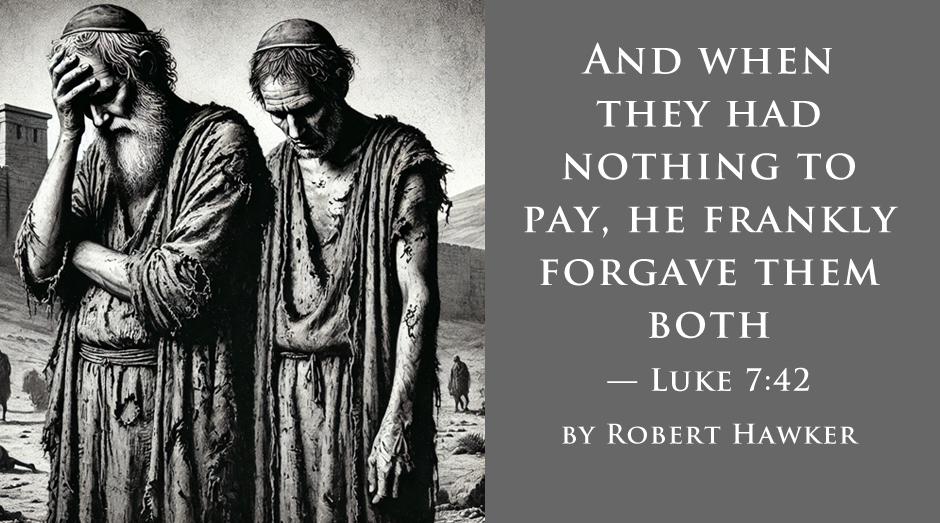And when they had nothing to pay, he frankly forgave them both

And when they had nothing to pay, he frankly forgave them both
October 2—Morning—Song of Solomon 3:1
"By night on my bed I sought him whom my soul loveth." — Song of Solomon 3:1
Pause, my soul, and reflect on the account the church gives of herself in this verse. Is this also your experience? It is truly night in the soul whenever Christ is absent, or when His presence is not enjoyed. And though, blessed be God, the believer’s standing in Christ does not change, the joy of feeling safe in Him is not always the same. Even if it is a bed of affliction or sickness, it is not a bed of complacency when the soul seeks after Jesus. We cannot be said to be in a cold, lifeless, or indifferent state if we are earnestly seeking Christ. It may be night; it may be a season of darkness. Yet, if we can say, "With my soul have I sought thee in the night; yea, with my spirit within me will I seek thee early," surely this earnestness reveals grace, love, and desire actively at work. Even though at times ordinances and the means of grace may seem dull and unprofitable, grace, like a live coal under the ashes, is not extinguished. The love for Him whom my soul loves often rekindles, showing that Jesus still lives and reigns within. Oh, precious Lord, You are still the most lovely, the chief among ten thousand. Be my all in all, the hope of glory.
October 2—Evening—Luke 7:42
"And when they had nothing to pay, he frankly forgave them both." — Luke 7:42
My soul, nothing can be more humbling and comforting to the awareness of your spiritual insolvency than this beautiful parable your Savior taught. Whether the debtor owed five hundred pence or fifty, both were equally unable to pay, and thus both became objects of mercy and were forgiven. This, indeed, is the nature of grace. It stands completely apart from merit and is directly opposed to it. If you had the slightest ability to claim divine favor or contribute even the smallest effort towards your own salvation, grace would no longer be grace. The free and full forgiveness of all debt testifies clearly to our total helplessness and the sovereign freedom of divine love.
Thus, when sinners of every kind are brought into this glorious redemption, the entire outcome is "to the praise of the glory of His grace, by which He made us accepted in the Beloved." How beautiful and comforting is this view of the gospel of Jesus! It is full, free, and suited to every case, perfectly matching the needs of every sinner. Since all have sinned and fallen short of God's glory, and all are equally unable to make even the smallest restitution, all are equally suited to receive divine mercy. No matter the size of the debt, in a state of complete insolvency, there is no barrier to pardon. Such is the proclamation from heaven’s court and the nature of the charter of grace.
Let all who are poor, bankrupt, helpless, and aware of their lost condition come to the mercy seat. The Son of God desires His court to be surrounded by such souls, and every person to whom His free salvation is welcome—no matter their circumstances—is welcome to receive it. Whether one owes ten thousand talents or only fifty, having nothing to pay, the Lord graciously forgives both! Oh, the unsearchable riches of grace! Thanks be to God for His indescribable gift!
